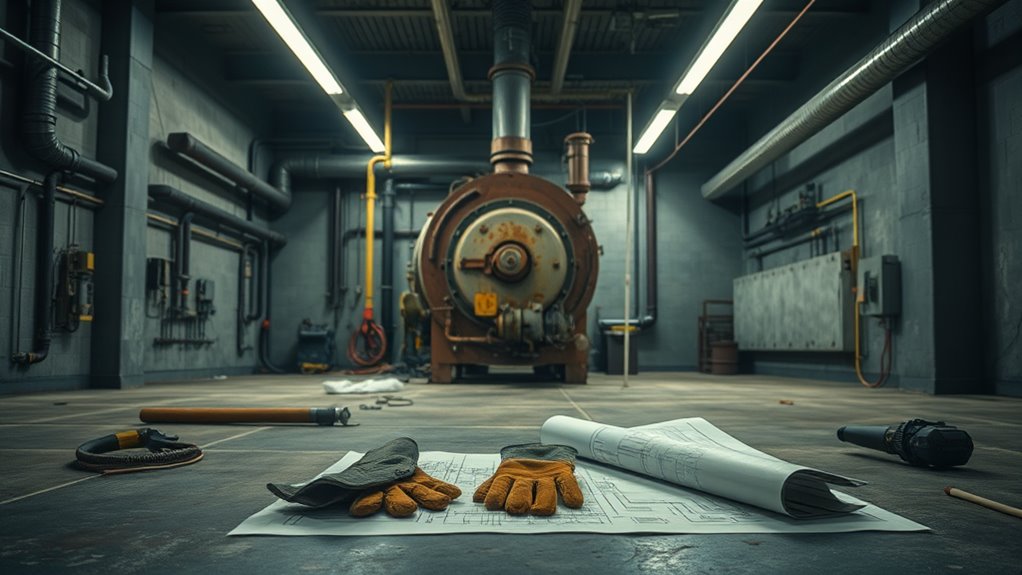As a commercial tenant, your responsibility for replacing the boiler depends on your lease terms. If the lease specifies that you're responsible for maintenance and replacements, then you might need to cover the costs. However, landlords often handle structural equipment like boilers, while tenants manage routine maintenance. It's essential to examine your lease carefully to avoid unexpected expenses. Understanding these nuances can help you navigate potential challenges effectively, and there's much more to contemplate regarding your obligations.
Key insights
- Commercial tenants are generally responsible for routine maintenance of the boiler, while replacement obligations depend on lease terms.
- Lease agreements should clearly outline the distinction between repair responsibilities and replacement costs for equipment like boilers.
- Local regulations may dictate whether the landlord or tenant is responsible for major repairs or boiler replacements.
- Clear communication in lease negotiations can prevent misunderstandings about boiler maintenance and replacement responsibilities.
- Tenants should review their lease for specific clauses related to boiler maintenance to avoid unexpected financial burdens.
Understanding Commercial Leases
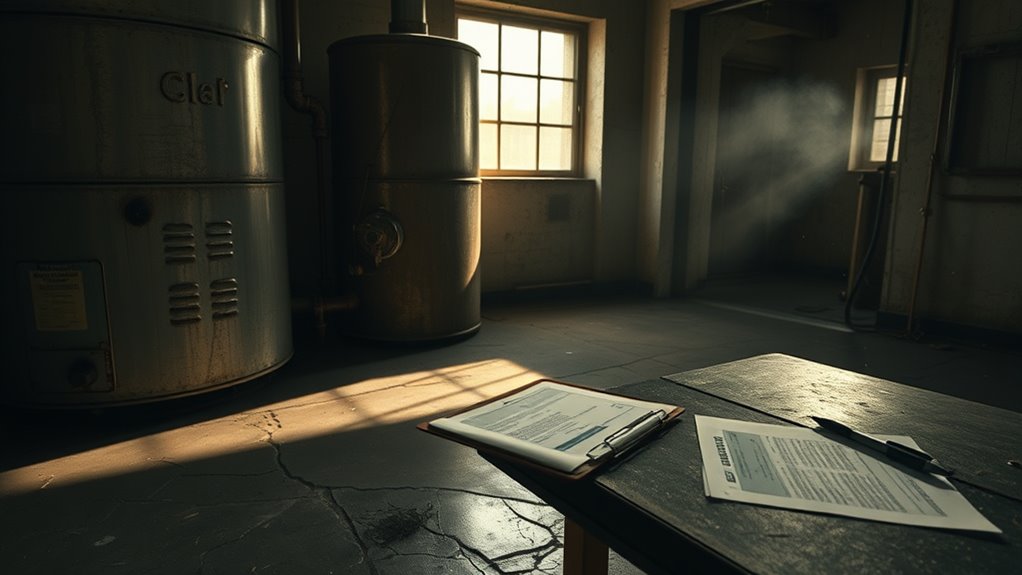
When you enter into a commercial lease, it's crucial to understand the specific terms that dictate your responsibilities, especially regarding maintenance and equipment like boilers. Your tenant obligations can greatly impact your operational costs and overall satisfaction with the space. Commercial leases often outline who's responsible for repairs, maintenance, and replacements; if you overlook these details, you could find yourself liable for unexpected expenses. It's important to assess how boiler maintenance is addressed in your lease. Failure to comprehend these obligations not only affects your financial planning but also your business's functionality. Always review and negotiate these terms carefully to guarantee you're prepared for any duties that come with your lease, ultimately safeguarding your investment and peace of mind. Additionally, understanding the importance of regular maintenance can help prevent costly breakdowns and enhance the reliability of your heating system.
Key Lease Clauses Relating to Repairs and Replacements
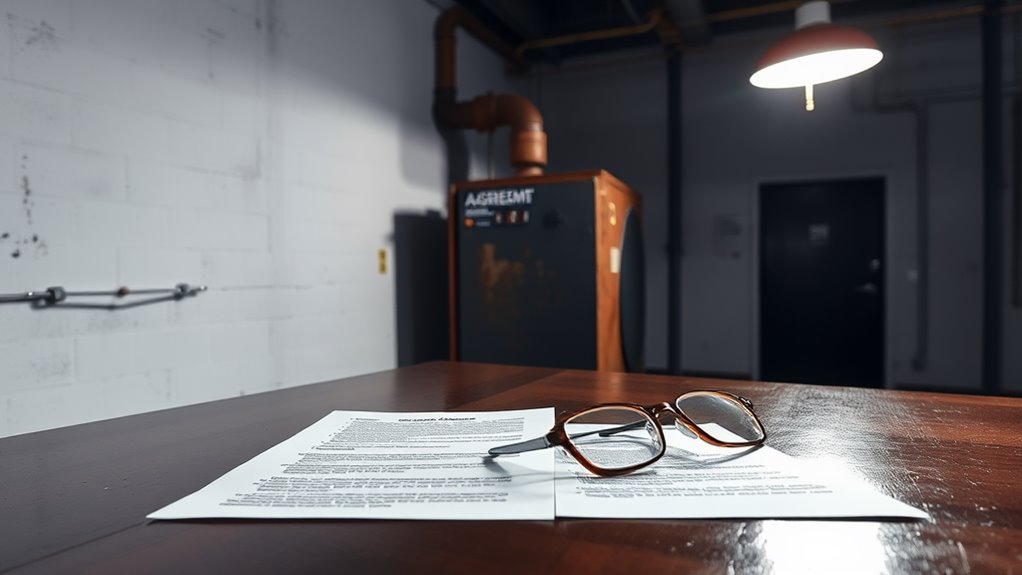
When you review your lease, pay close attention to the maintenance responsibilities defined within. Understanding the distinctions between repair and replacement obligations can greatly impact your financial liability. The specific language used in your lease agreement will dictate your responsibilities, so make sure you grasp these critical clauses. Additionally, be aware that regular servicing ensures safe and efficient operation, which can influence your obligations regarding boiler maintenance.
Maintenance Responsibilities Defined
Understanding maintenance responsibilities in a commercial lease is essential, as these obligations directly impact both tenant operations and property management. Clear maintenance agreements outline your tenant obligations, specifying what you're responsible for and what falls to the landlord. Typically, landlords handle structural repairs, while tenants manage routine maintenance. If the lease lacks clarity, disputes can arise, particularly regarding costly repairs like boiler replacements. You must review key lease clauses carefully to guarantee you understand your responsibilities and avoid unexpected expenses. A well-defined maintenance agreement not only protects your interests but also fosters a smooth landlord-tenant relationship. Knowing your obligations helps you budget appropriately and maintain compliance, ensuring your business operates efficiently without disruptions tied to maintenance issues. Additionally, regular maintenance protects investments in equipment, keeping HVAC systems in optimal condition while reducing wear and tear.
Repair vs. Replacement Obligations
Repair and replacement obligations in commercial leases can greatly affect your financial responsibilities and operational efficiency. Understanding the distinction between repair obligations and replacement costs is vital. Generally, repair obligations cover routine maintenance and minor fixes, ensuring that the existing systems function properly. In contrast, replacement costs arise when equipment, like a boiler, fails beyond repair. Your lease should clearly define these responsibilities; otherwise, you might face unexpected expenses. If you're liable for replacement costs, this could greatly strain your budget and disrupt your operations. As a result, reviewing the lease agreement thoroughly is essential to clarify your obligations and avoid costly surprises down the line. Knowing your responsibilities can help you manage risks effectively and maintain smooth business operations. Additionally, understanding the installation process for commercial boilers can provide insights into potential costs and responsibilities associated with replacements.
Lease Agreement Language
While lease agreements often include various clauses that outline responsibilities, it is crucial to pay special attention to those specifically addressing repairs and replacements. Understanding the lease language can help clarify your tenant obligations, particularly regarding maintenance issues like a boiler. Here are three key clauses to look for:
- Repair Obligations: Specifies which party is responsible for routine maintenance and urgent repairs.
- Replacement Requirements: Details the conditions under which equipment, like a boiler, must be replaced.
- Notice Provisions: Outlines how and when you must inform the landlord about maintenance issues. Additionally, ensure that your lease complies with legal requirements regarding the safety of gas appliances and systems.
Local Laws and Regulations Impacting Responsibilities
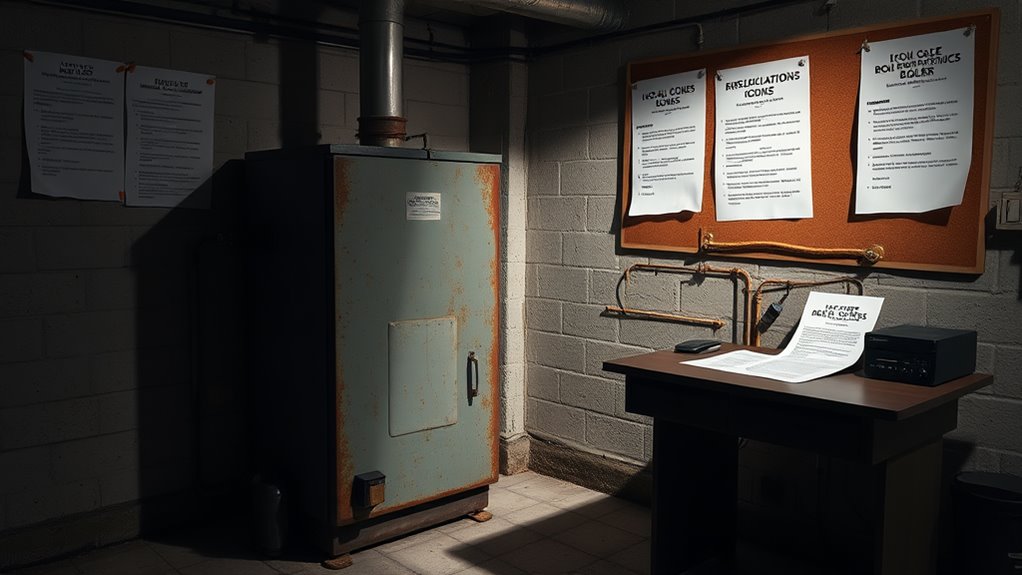
Understanding local laws and regulations is vital for your responsibilities as a commercial tenant. These rules often shape lease agreement clauses and dictate compliance with local building codes and landlord-tenant laws. Ignoring them can lead to costly legal repercussions, so it's important to stay informed. Regular maintenance and servicing of equipment like boilers can also be a tenant's responsibility to ensure compliance with safety regulations.
Lease Agreement Clauses
When negotiating lease agreements, it's important to take into account local laws and regulations that can greatly affect responsibilities regarding boiler maintenance and operation. Understanding these factors is vital for accurate lease interpretation and clarifying tenant obligations. Here are three key considerations:
- Boiler Maintenance Requirements: Local regulations may dictate who is responsible for regular maintenance, impacting your obligations as a tenant.
- Replacement Responsibilities: Some laws may require landlords to cover major repairs or replacements, which could relieve you of that financial burden.
- Liability Clauses: Confirm your lease includes clear clauses outlining liability for damages related to boiler failure, protecting your interests. Additionally, understanding the E119 error code can help you identify potential issues with the boiler that may require attention.
Being informed about these elements will help you negotiate a lease that aligns with your responsibilities and rights.
Local Building Codes
Local building codes play a significant role in determining a commercial tenant's responsibilities regarding boiler operation and maintenance. These local regulations outline specific compliance standards that must be met for safety and efficiency. As a tenant, it's essential to understand how these codes impact your obligations. If the boiler's upkeep falls under your purview, failing to comply with these standards can lead to legal ramifications and potential fines. Additionally, you might be held accountable for any violations that arise from neglecting maintenance or operational duties. Consequently, regularly reviewing local building codes guarantees you maintain compliance and protect your business. By staying informed, you can navigate your responsibilities effectively and avoid unnecessary complications. Furthermore, understanding the benefits of energy-efficient heating systems can help you make informed decisions about your operational responsibilities and potential upgrades.
Landlord-Tenant Laws
Maneuvering landlord-tenant laws is essential for defining your responsibilities as a commercial tenant, especially regarding boiler management. Understanding these laws not only safeguards your tenant rights but also clarifies your lease obligations. Here are three key aspects to reflect upon:
- State Regulations: Local laws may dictate who's responsible for boiler maintenance and replacement.
- Lease Terms: Your lease may have specific clauses that outline the responsibilities for appliances like boilers.
- Tenant Rights: If the boiler fails, knowing your rights can help you negotiate repairs or replacements effectively. Additionally, understanding common boiler error codes can assist in identifying issues quickly and improving communication with your landlord about repairs.
The Role of Maintenance and Upkeep in Lease Agreements
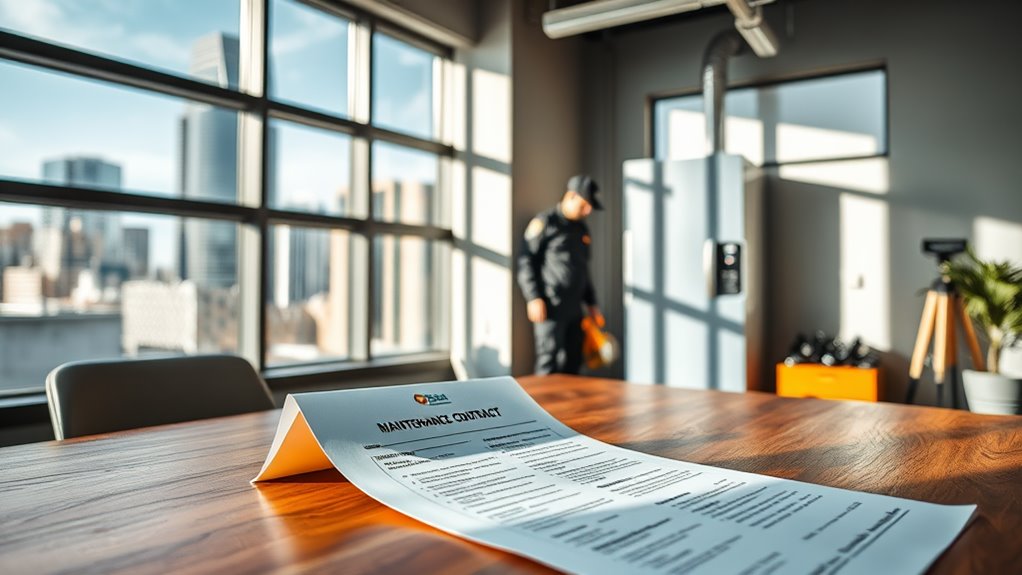
While it may seem straightforward, the maintenance and upkeep of boiler systems in commercial leases often become contentious issues between landlords and tenants. You need to understand your tenant obligations regarding these systems. Lease agreements typically specify maintenance standards, which outline who's responsible for upkeep and repairs. If your lease states that you're responsible for the boiler's maintenance, you must guarantee it meets those standards to avoid penalties. Failure to comply could lead to costly disputes or even lease termination. Consequently, it's essential to thoroughly review your lease and clarify any ambiguous terms. By understanding your responsibilities, you can prevent misunderstandings and maintain a productive relationship with your landlord, ensuring a smooth operation for your business. Regular inspections and preventative maintenance tips can also help mitigate potential issues with the boiler system.
Negotiating Responsibilities During Lease Discussions
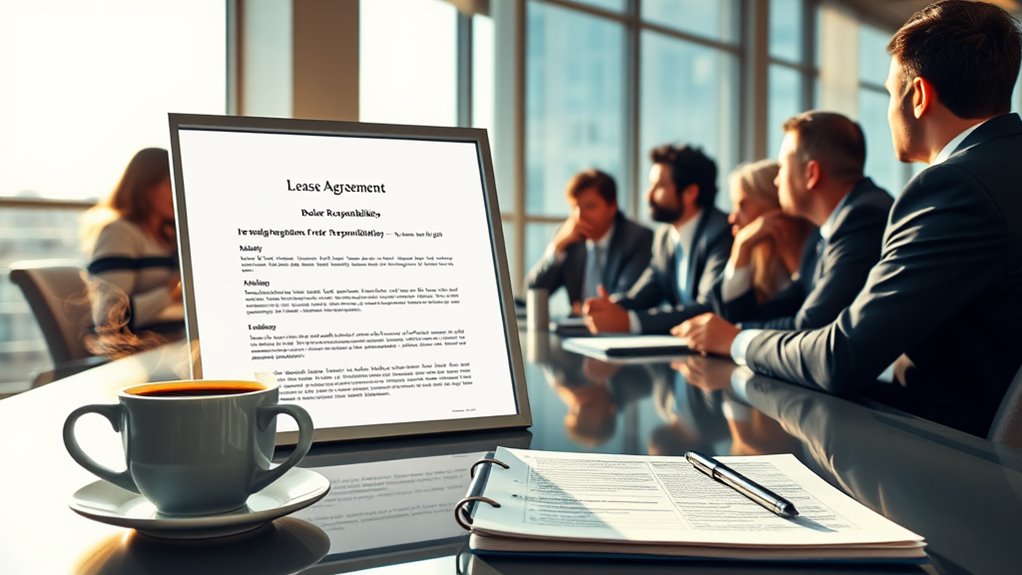
Understanding your maintenance obligations sets the stage for effective negotiations during lease discussions. Clarifying tenant obligations upfront can save you headaches later. Here are three key areas to focus on during your lease negotiation:
- Maintenance Scope: Define what's included in your responsibilities—specify if the boiler, HVAC, or plumbing falls under your care.
- Repair Costs: Discuss who bears the financial burden for repairs or replacements. Make sure you understand the implications of major repairs.
- Routine Inspections: Establish who's responsible for regular maintenance checks. This can prevent costly breakdowns and disputes.
Best Practices for Landlords and Tenants
To guarantee a smooth landlord-tenant relationship, it's crucial to adopt best practices that promote transparency and cooperation. Establish open lines of tenant communication regarding boiler maintenance and other critical issues. Regular updates about maintenance schedules and potential concerns can prevent misunderstandings and foster trust.
Both parties should clearly outline their responsibilities in the lease agreement, specifying who's responsible for boiler maintenance and repairs. Regularly scheduled inspections can help identify problems early, ensuring proper functioning and compliance with safety regulations.
Encouraging tenants to report any issues promptly can greatly reduce the risk of costly repairs later on. By prioritizing communication and clarity, you create a collaborative environment that benefits both landlords and tenants, ultimately leading to a more successful rental experience.
Resolving Disputes Over Boiler Replacement Responsibilities
Disputes over boiler replacement responsibilities can arise even in the most well-structured landlord-tenant relationships. To resolve these conflicts effectively, consider the following steps:
- Review the Lease Agreement: Understand the specific terms regarding boiler maintenance and replacement to clarify responsibilities.
- Engage in Open Communication: Discuss the issue directly with your landlord or tenant. Clear dialogue can often prevent misunderstandings.
- Utilize Dispute Resolution Techniques: If disagreements persist, consider mediation or arbitration as structured approaches to reach a resolution.
Maintaining a proactive stance on boiler maintenance can also mitigate future disputes. By being informed and communicative, you'll foster a healthier relationship and reduce the chances of costly conflicts over responsibilities.
Frequently Asked Questions
What Happens if the Boiler Breaks Down Unexpectedly?
When the boiler breaks down unexpectedly, you'll need to follow specific procedures to address the issue. First, assess your boiler maintenance responsibilities outlined in your lease. Notify your landlord immediately to discuss repairs and responsibilities. If you're responsible, contact a certified technician for prompt service. Document all communication and actions taken, as this will protect you in case of disputes. Timely resolution is essential to minimize disruptions to your business operations.
Can Tenants Request Upgrades to the Boiler System?
Yes, you can request boiler upgrades as a tenant, especially if it impacts your business operations. Understanding your tenant rights is vital; many leases allow for improvements to guarantee the space meets your needs. When making your request, be clear about how the upgrades benefit both you and the property owner. A well-articulated proposal can strengthen your case, potentially leading to a more efficient and reliable heating system for your commercial space.
How Can Tenants Prove Boiler Issues to Landlords?
To prove boiler issues to your landlord, document everything meticulously. Take clear photos of any problems, like leaks or unusual noises, and keep records of all boiler maintenance. You can also gather receipts for any repairs you've made or requested. Knowing your tenant rights is essential; inform your landlord promptly, and reference local laws to strengthen your case. A proactive approach can guarantee your concerns are taken seriously and addressed promptly.
Are There Warranties for Commercial Boilers?
Yes, there are boiler warranties available for commercial boilers, which typically cover parts and labor for a specific period. However, you should be aware of warranty exclusions that might apply, such as neglect or improper maintenance. It's important to read the warranty terms carefully to understand what's covered and what's not. By doing so, you can avoid unexpected costs and guarantee your boiler operates efficiently, protecting your investment and minimizing downtime.
What Insurance Covers Boiler Replacement Costs?
When considering insurance for boiler replacement costs, boiler insurance is your best option. It typically covers damages due to malfunctions or failures. However, you need to pay attention to coverage limits, as they can vary considerably between policies. Make sure to read the fine print and understand what's included. Evaluating different policies will help you find the right coverage that fits your business's specific needs, ensuring you're protected when issues arise.
Summary
In summary, whether you're responsible for replacing the boiler hinges on the specifics of your lease agreement. You should carefully review key clauses related to repairs and maintenance, and consider local laws that may impact your obligations. By negotiating responsibilities upfront and adhering to best practices, you can avoid disputes down the line. Ultimately, understanding your lease's terms empowers you to make informed decisions and guarantees a smoother relationship with your landlord.

